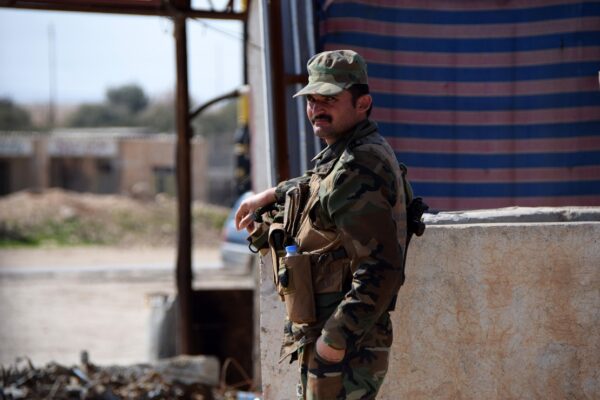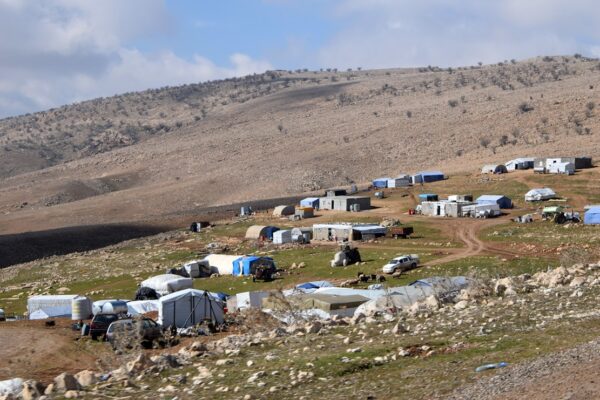Free West Media Followed Yazidi Warriors in Iraq
After heavy fighting and thousands of casualties, Yazidi warriors together with the Kurdish military Peshmerga managed to retake the mountain town of Sinjar from the Islamic State, close to the Syrian border in northern Iraq. Mass graves and ruins bear witness to the ravages of the Islamic State, and the war has forced more than 30,000 Yazidi families to live in refugee camps in the mountains. New Times got a unique opportunity to visit the camps that Europe has deprioritized and follow the soldiers defending their hometown against the Islamic State, which is only a hundred metres away. Together with the help organization Hatune Foundation we visited the camps.
Published: March 3, 2016, 10:40 pm
* Islamic State a stone’s throw away
* Mass graves bear witness to devastation
* Thousands are trapped in refugee camps in the mountains – receive no aid
– We’d never move to Europe. You are letting in forces that want to harm you and your culture. You are feeding your own destruction, and then you just wait for it to ruin you and your country. Here, we face the enemy and do battle against the evil. We stay here. We’d never run.
These words are spoken by a soldier from the Yazidi minority. He and his men are fighting against the Islamic State, and have been doing so for the last two years. The slenderly built man, his body wrapped in several layers of sweaters to protect against the cold, takes a puff at his cigarette and exhales. The smoke fills the room where soldiers are squatting down for a warm meal. It’s been a hard day.
An hour earlier, several officers and soldiers were summoned to the bomb-wrecked town centre. The Islamic State had fired a gas bomb aimed at the police headquarters and the Yazidi police leadership, which also commands the Yazidi warriors stationed at the Iraqi-Syrian border. No one was killed by the attack, though we later learned that the gas caused people close to the impact to vomit and become sick. When we visit the police leadership a few hours later, they are in surprisingly good spirits, laughing and taking pictures of the European team. It’s a rare day when they are visited at the front lines. “The town of death,” someone remarks bitterly. “Who’d want to come here?”
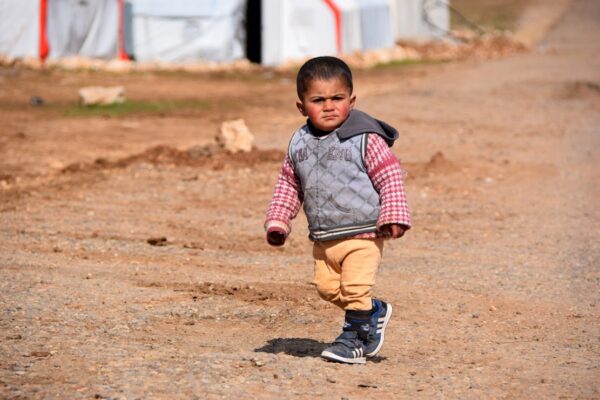
A child in a large refugee camp for Yazidi people.
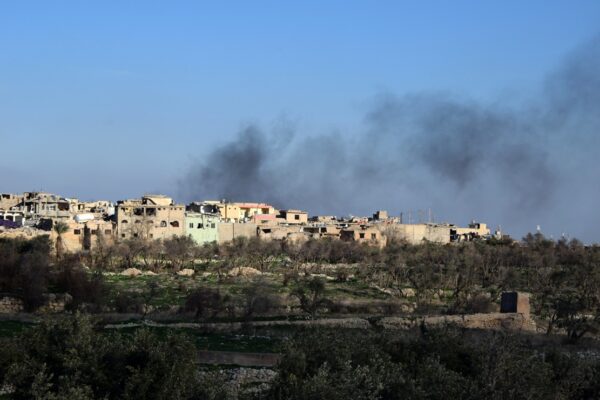
THE ISLAMIC STATE FIRES A GAS BOMB INTO SINJAR, trying to hit the Yazidi-run police headquarters. Yazidi self-defence forces and the Kurdish military Peshmerga liberated the town from ISIL a while ago, but by then it was completely devastated and the death toll approaching 5,000. Today, the town is deserted except for the soldiers holding it. ISIL is still present on the outskirt of the town.
Behind their good cheer, a brutal reality lurks. These men have seen the very worst humanity has to offer. The Islamic State is just a hundred metres away, and a few guard towers and a two-metre-high, makeshift wall separate the two factions. Twenty metres from ISIL territory, bones stick out of the ground. A human skull is lying on a rock. In a bath house pool lie close to a hundred skeletons of women and children. The well-preserved hair on the skeleton of a young girl, probably around eight years old, catches my eye. These are the remains of women who refused to convert to Islam when ISIL took the town in 2014. Around 400 women had taken shelter in the town’s bath house as the battle raged outside, but ISIL showed them no mercy. Our local guide says we need to move on quickly; if ISIL militants spot movement they will open fire. We silently depart for the next mass grave.
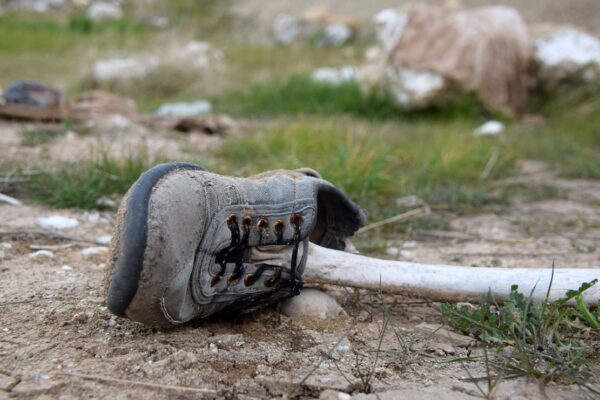
DEATH AND DESTRUCTION. A stone’s throw from ISIL territory lies this mass grave, with the remains of around 80 male Yazidi civilians. In another mass grave, a few kilometres away, the bodies of about 100 women were thrown after being murdered by the ISIL for refusing to convert to Islam.
– My father-in-law lies here, our guide says, keeping a stiff upper lip.
In this grave are the remains of over 80 civilian males killed by the Islamic State. The site is only a stone’s throw from ISIL territory. The belongings of the dead men lie next to their bones. Car keys and other everyday items, like a water bottle and a pair of sunglasses, tell of a different time. Almost 5,000 Yazidi died in Sinjar. Few have received a proper burial.
When ISIL advanced on Sinjar, many civilians tried to escape from the mountains to the city of Dohuk and other comparatively safe Kurdish settlements nearby. One car wreck after another along the mountainside show that not all of them escaped death.
− Many of our people jumped into their cars when they heard ISIL was getting close. But as they drove down the mountain, ISIL fired upon them. Hence the car wrecks you see everywhere, our local guide tells us.
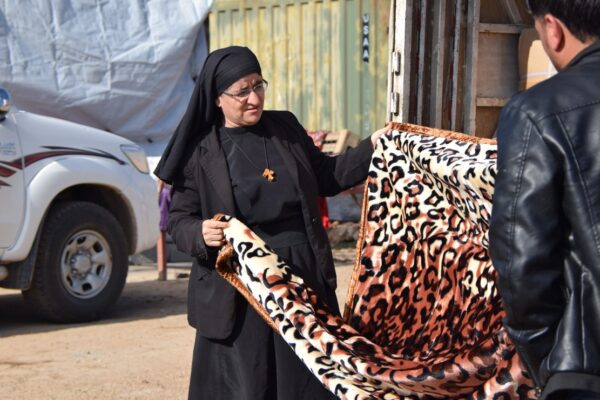
THE TURKISH-GERMAN NUN HATUNE DOGAN travelled to the refugee camps in the Sinjar mountains with gas, warm blankets, soap and laundry detergent. “These people get no aid from anyone, not even their own country”, Hatune told New Times. The temperature in the mountains is often below freezing point, and the cold is a major problem.
We pass a mountain top where around 40 young Yazidi women took their own lives after falling into ISIL captivity. Having been brutally raped, the women felt they had no reason to live on even if they, against all odds, were to be released, so they threw themselves from the mountain together. On the fields around us, red-painted sticks mark the many mines that still lie under the ground, placed there by the Islamic State.
The smoke from the gas bomb spreads across parts of the bomb-wrecked town. Black smoke seeps through the ruins, a couple of soldiers wave at us from the street. Out guide is a well-known police officer, appreciated by his men. The formerly lively town of Sinjar is deserted by everyone except the soldiers with guns flung across their backs. Up in the mountains, thousands of Yazidi women and children live in camps, and all that separates them from death are the Yazidi men of all ages who still fight. They aren’t really equipped for the task, but regard it as their duty and only option.
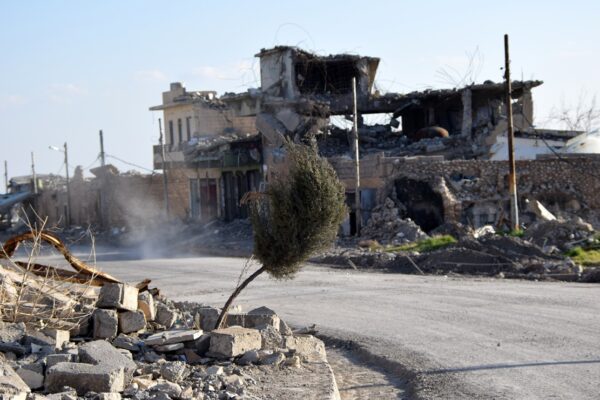
A city in ruins. In the town of Sinjar, only soldiers reside nowadays. Around 5,000 people were killed here between 2014 and 2015..
− We don’t have a lot of weapons at all. Our enemies have large amounts of modern weaponry. Our best weapons are those we captured from the Islamic State, says one of the leading Yazidi warriors, tapping his Kalashnikov. He explains that during the battle for Sinjar, a highly decorated Yazidi warrior managed to take over one of ISIL’s tanks, turning the tide of battle against the islamists.
The far-flung areas around the town − those not under ISIL control − are ruled by the Kurdish military Peshmerga, whose forces are predominantly Muslim. Although they cooperate against their common enemy ISIL, there is still an amount of antagonism that makes life harder for the Yazidi civilians in the refugee camps. New Times accompanied the Turkish-German aid worker Hatune Dogan, who had bought hundreds of blankets, bars of soap and bags of washing powder for distribution in the mountain camps. To obtain permission to drive a truck to the camps, she visited the Peshmerga administrators in their office in the local Kurdish capital Durhok. One of those administrators told Dogan that she shouldn’t be helping the Yazidi minority, but after many ifs and buts, he gave her permission to supply the camps with necessities.
Having obtained a written permission, the truck still gets stuck at a checkpoint due to some technicality. When we finally get to pass the checkpoint, Hatune Dogan is visibly frustrated.
− Those thousands of families who are trapped in the Sinjar mountains get no aid from outsiders. Not from the UN, and hardly from anyone else either. The government doesn’t care, and you saw for yourself how difficult it was for us just to get some blankets to them. We had to wait for eight hours at the checkpoint despite already having clearance!
The wind blows hard in the mountains. The air is cold, and dusk is falling. Thousands of people will suffer through another chilly night, but thanks to Hatune Dogan, around 2,000 of those families will be considerably better off. Dogan brought both gas and blankets to make their situation more bearable.
Today, ISIL still controls nine of the surrounding villages which can be seen from the top of the mountain. On our way back to the Kurdish city of Erbil, we must pass by the city of Mosul in the darkness, which makes our guide worry. Since 2014, the city is in the hand of the Islamic State. In this case, however, the journey is uneventful, and we can catch some sleep on the plane to Turkey.
For those soldiers who are constantly guarding against the next ISIL attack, the nights are long. But running away is not an alternative. No, they would never go to Europe, those soldiers say. Our politics are far too ill-conceived. Our open borders will have terrible consequences, they warn. We are letting evil warm itself by our hearth. welcoming it into our midst in the name of kindness, while forgetting those poor souls freezing in the mountains. For them, there are no resources left. They have been sacrificed on the altar of humanitarianism.
All rights reserved. You have permission to quote freely from the articles provided that the source (www.freewestmedia.com) is given. Photos may not be used without our consent.
Consider donating to support our work
Help us to produce more articles like this. FreeWestMedia is depending on donations from our readers to keep going. With your help, we expose the mainstream fake news agenda.
Keep your language polite. Readers from many different countries visit and contribute to Free West Media and we must therefore obey the rules in, for example, Germany. Illegal content will be deleted.
If you have been approved to post comments without preview from FWM, you are responsible for violations of any law. This means that FWM may be forced to cooperate with authorities in a possible crime investigation.
If your comments are subject to preview by FWM, please be patient. We continually review comments but depending on the time of day it can take up to several hours before your comment is reviewed.
We reserve the right to delete comments that are offensive, contain slander or foul language, or are irrelevant to the discussion.
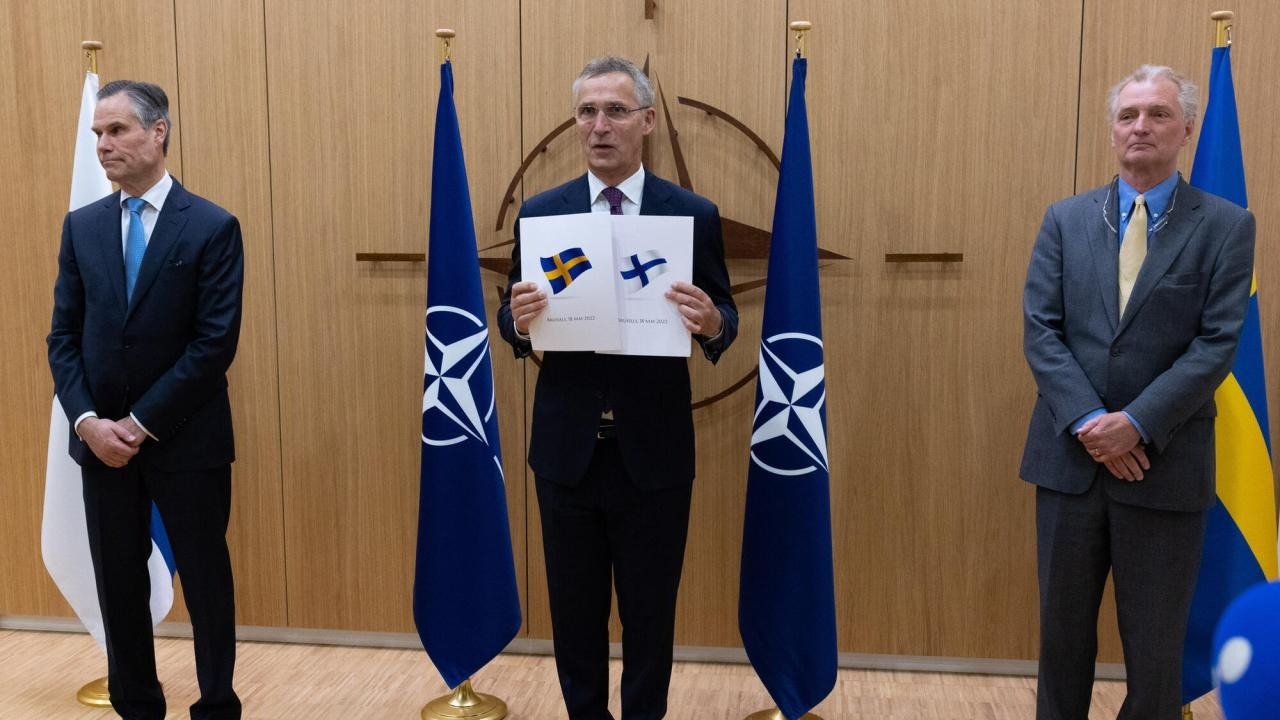
Sweden’s Path into NATO – What has happened
For over 200 years, Sweden has maintained its non-alignment and neutrality. Although the political parties have been predominantly supportive of NATO, they have refrained from pushing the issue, as public opinion has strongly favored maintaining neutrality. However, after Russia’s invasion of Ukraine, the time seemed ripe. It suddenly became urgent to join NATO before public opinion shifted back. However, the burning of Qurans and Turkey’s capriciousness have caused complications.
Spela på dina egna villkor
Det är väl inte särskilt konstigt att man vill kunna bestämma själv över olika val i sitt liv, som med hur man vill använda sig av olika spel. Denna möjlighet är dock större då man väljer onlinespel.
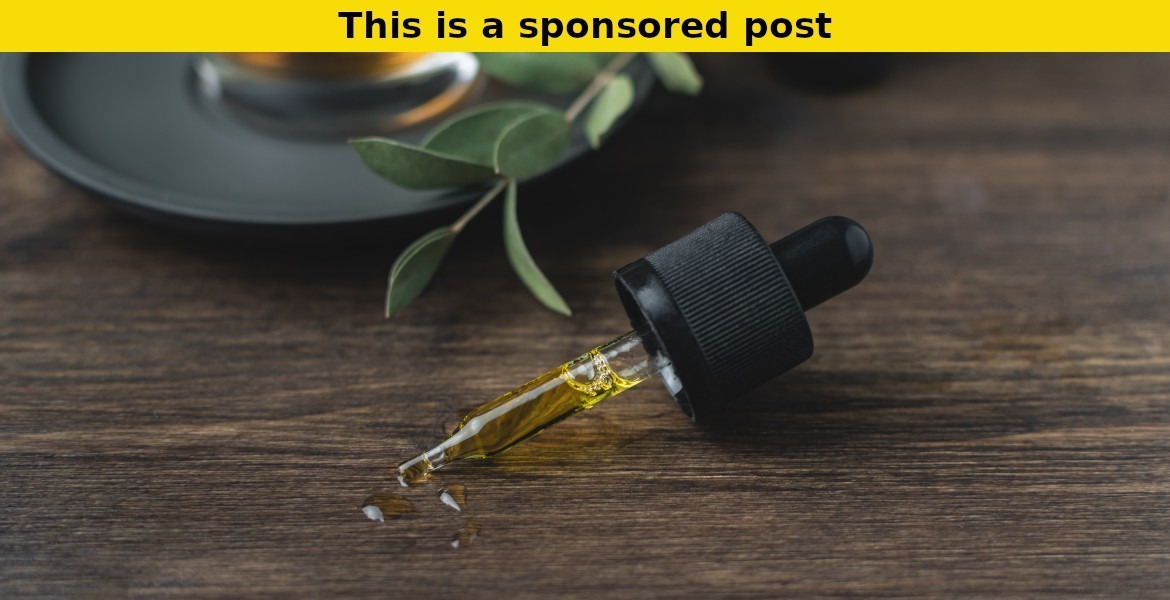
Health Benefits of CBD and What People Use It For
The CBD compound is the second most popular compound we get through extraction from hemp and cannabis plants. The number one in popularity is THC, of course. When we think of THC, we usually connect it to the state of feeling “high,” sometimes even too intensely.

Australian doctors denounce anti-hydroxychloroquine study as fake
MelbourneAustralian infectious disease researchers have raised the alarm about fake data in a study published in The Lancet denouncing the drug hydroxychloroquine in the treatment Covid-19. The Australian Department of Health has been stockpiling millions of doses of hydroxychloroquine.
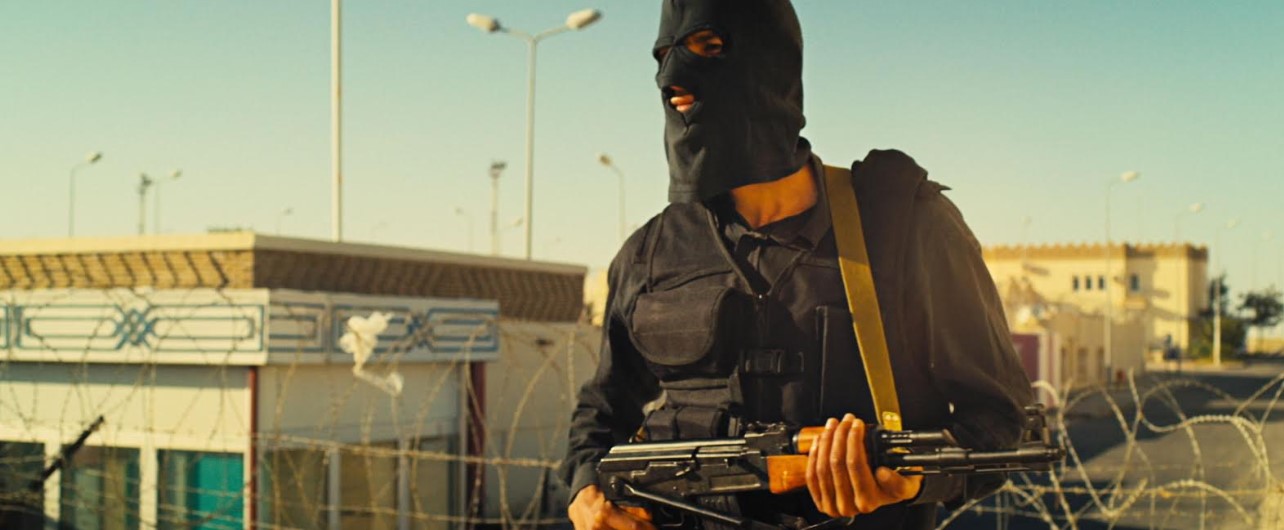
‘Shugaley’: In the hands of Islamist terrorists
The Coronavirus pandemic has not been not an obstacle for the release of a new Russian movie about Libyan war, available online from April.
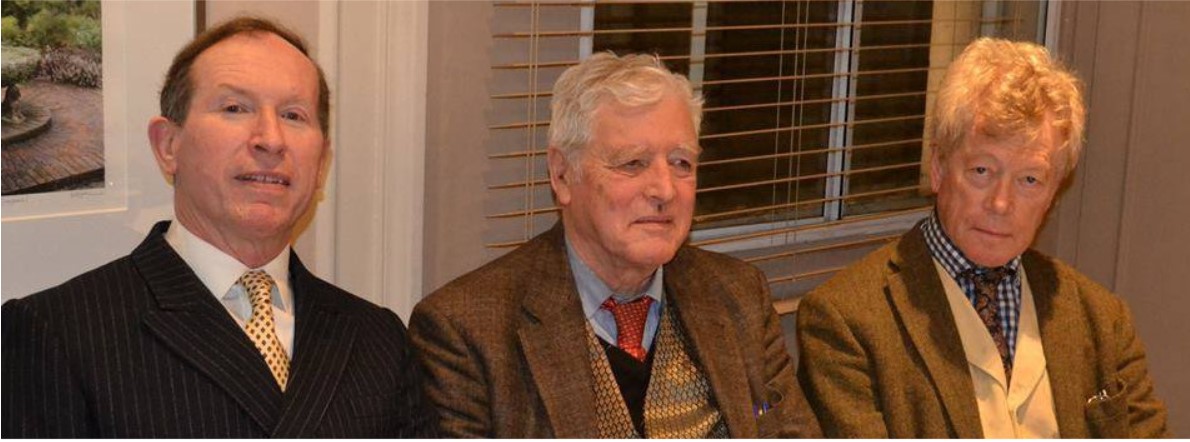
Roger Scruton’s friend: ‘He gave us hope’
Conservative philosopher Roger Scruton is dead. He died on January 12 of cancer. Scruton was honoured in 2016, but last year was subjected to a brutal smear campaign by the mainstream media and was at the end of his life persona non grata among the establishment. When death was imminent, Scruton told him that he had been deprived of both health and reputation, but expressed no resentment, only gratitude for all the positive things he had been involved in. The Swedish news outlet Nya Tider has spoke to Scruton's friend Gregory Lauder-Frost from the Traditional Britain Group.

Merry Christmas to all our readers!
The editorial staff of FreeWestMedia wishes you a blessed Christmas and a happy New Year! We thank you for the loyalty you have shown us throughout the year and for your support.
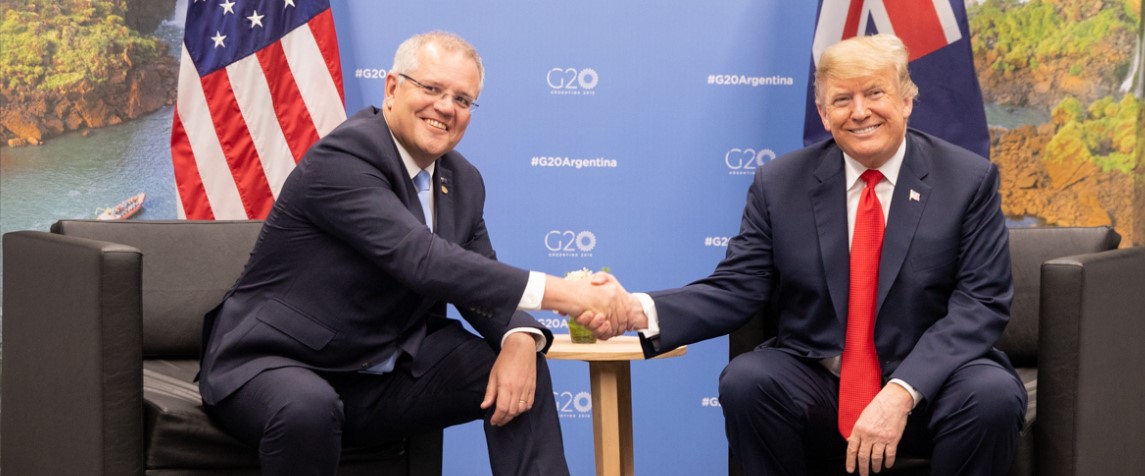
Australia creates fake horoscopes to deter Sri Lankan migrants
CanberraFor two years, Australian authorities have been broadcasting horoscopes with harmful predictions to dissuade potential migrants from carrying out their project.

Will the Yellow Vests conquer the municipal elections?
In the run-up to the 2020 municipal elections, the Yellow Vests intend to weigh in by loudly claiming their demands at a local level. And they will do so without necessarily presenting a list.






